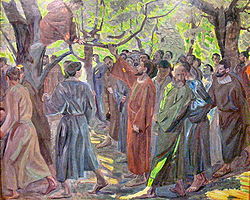When Jesus was walking around on earth, in between turning water into wine and chillin’ with sex workers and other folks that society didn’t look on too fondly, he talked a lot about forgiveness. And when Jesus talked about forgiveness, it was always radical. It always gave power to the people in society that had none. It always humbled those who were in positions of power while asserting the humanity of those who had been affected by the abuse of power.
I mean, take the woman caught in the act of adultery. Those in power wanted to condemn her, kill her, deflect their own guilt onto her. But Jesus stood up, shamed her accusers, and forgave a woman that those in power didn’t see worthy of forgiveness. With his words, he dismantled the structure of the powerful judging and punishing the powerless. With his words, stones fell to the ground, and the powerful walked away, embarrassed, while the woman stood up and went home with a second chance. It was awesome.

What about Zacchaeus? A man who had been given a huge amount of power by the Empire. He was a tax collector, and he abused his power and took more taxes than the person owed, pocketing the extra money for himself. He wasn’t dragged to Jesus by an angry mob. Jesus didn’t scold his accusers, tell them to drop their stones, and lovingly lift Zacchaeus out of the dust, telling him to “go and sin no more.” Nah, because Jesus knew that simply doing that wouldn’t change anything. The tax collectors would still be in power. They would still use their power to abuse those who had none. Jesus forgave Zacchaeus, but Zacchaeus had to make amends. Zacchaeus gave back the money he stole times four. He gave back half of his possessions to the poor.
Two different people, both hated by society for different reasons. Two different requirements for forgiveness. The powerless woman was simply told to go and sin no more. Jesus used the occasion, not to shame her, but to shame her accusers. The powerful man was forgiven too. Jesus forgave him, and ate at his house, but Jesus’s forgiveness led him to give up his power.
Jesus used the concept of forgiveness to change society.
So why, today, do we use it to keep oppressive hierarchies in place?
Today, forgiveness looks like this:
The powerless person comes to the front of the church. The church leaders forgive, all while declaring to the world to “take note,” of how gracious they are to be dropping their stones. These terrible “sinners” deserve death, an eternity in hell. But the leaders forgive anyway because of how holy the leaders are. Now comes the punishment. The powerless person must leave the church, or must be continuously accountable to someone else. They’ve lost the privilege of freedom and privacy. They are more powerless now than they were before they asked forgiveness for their “sin.”
The powerful person comes to the front of the church. He has sinned, and has been called out for his sin. He stands in front of the church to apologize, but his apology comes with a condition for his accusers.
“You must now apologize to ME,” he said. “When you told me I was wrong, when you called me abusive and hateful, you hurt my feelings. I demand an apology for that.”
His accusers look desperately to their leaders for help, but the leaders only nod in agreement with what the powerful man is saying. Some of the accusers are too hurt. They aren’t ready to forgive. The church leaders shame them with, “How dare you not forgive one who has hurt you so little when your sins hurt Jesus so much?”
Later, when those who accused the powerful man ask for that man to be kept accountable so he doesn’t hurt anyone else, the church leaders remind them, “His past is in the past. If you keep bringing it up, you’re not really forgiving him. Neither will your heavenly father forgive you.”
Forgiveness is no longer a radical tool that gives new life to those who have been cast out of society. It is now a tool of the oppressors. A tool that rips away the little autonomy and power that the powerless have managed to gather for themselves. A tool that uses even the most horrible sins of those in power to remind the powerless of who’s in charge.
Forgiveness, as used by most Christians today, makes me feel lost and hopeless. It makes me want to give up. It means that my hurt doesn’t matter and my desire for change can be twisted and construed as oppression itself.
Forgiveness, like humility, is a word that those of us who believe Christianity is liberating need to reclaim. Forgiveness means that the powerless have access to God, even when the powerful try to bar us from God. Forgiveness means that God gives the powerful a second chance to humble themselves, give up their power, and join in solidarity with the oppressed.
There are so many words and concepts in Christianity that were beautiful things. Powerful people have stolen those liberating concepts from us. Let’s take them back.
Edits: 12/12/13–edited this because it included stigmatizing language about sex workers. I was unaware when I wrote this that “prostitute” has a stigma attached to it that many sex workers want to move away from. I apologize for my ignorance and will use better language in the future.











